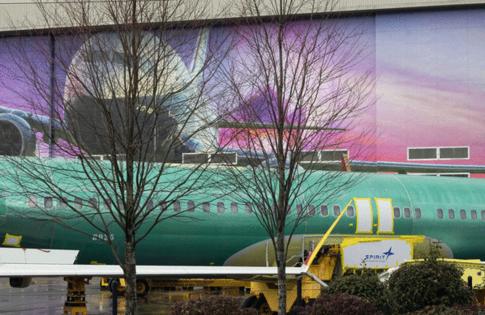FAA proposes $3.1 million fine for Boeing safety violations
Published in Business News
The Federal Aviation Administration proposed Friday fining Boeing $3.1 million for safety violations in the months leading up to the Alaska Airlines 737 MAX panel blowout last year.
The regulator said it “identified hundreds of quality system violations” at the manufacturer’s Renton factory and its supplier Spirit AeroSystems between September 2023 and February 2024.
That September, a fuselage made its way through Spirit’s Wichita, Kansas, factory, where workers construct the 737 MAX fuselages before shipping the structures to Boeing’s Renton plant for final assembly.
In January 2024, a panel flew off that fuselage midflight, leaving a gaping hole in the side of the plane.
The FAA did not provide more detail Friday on the quality system violations it found in Boeing’s operations during that time period.
The regulator said Boeing presented two un-airworthy aircraft to the FAA for airworthiness certificates and failed to follow its quality system.
Additionally, the FAA said Boeing interfered with a safety program designed to let certain Boeing employees help FAA workers maintain oversight of the manufacturer.
Boeing’s involvement with the program — called Organization Designation Authorization, or ODA — has been heavily scrutinized in the past, with FAA-deputized Boeing employees reporting that they felt pressured to act in the interest of their employer and feared retaliation if they raised safety concerns.
The FAA said Friday that a Boeing employee who was not involved in the ODA program pressured an ODA worker to sign off on a 737 MAX airplane so Boeing could meet its delivery schedule, even though the ODA worker had determined the aircraft did not comply with standards.
In response to the FAA’s proposed fine, Boeing said Friday in a statement, “We regret the January 2024 … accident and continue to work on strengthening our safety culture and improving first-time quality and accountability across our operations.”
The company has spent the months since the panel blowout designing and implementing a safety and quality plan, including key performance metrics to gauge the quality of its airplanes as they move through the factory.
“Our team continues to implement these improvements, such as investing in workforce training, strengthening production system compliance and encouraging employees to speak up,” Boeing said in its statement.
Spirit did not respond to a request for comment.
As part of Boeing’s plan to improve quality and safety, it will bring Spirit back into its fold, roughly 20 years after spinning it out. The acquisition is still pending regulatory approval but both companies expect it will be finalized this year.
Boeing has 30 days to respond to the FAA, the agency said.
The FAA said Friday it “utilized its maximum statutory civil penalty authority.” Still, the $3.1 million fine is minor compared to Boeing’s $22.8 billion in revenue in the most recent fiscal quarter. Overall, Boeing reported a net loss of $612 million, or 92 cents per share, for the three months from April to June.
The fine is also smaller than previous penalties issued by the FAA, including a $17 million fine issued in 2021 for 737 production mistakes and a $12 million fine issued in 2015 for a pattern of falsified paperwork.
William Alderman, founding partner of the aerospace and defense financial firm Alderman and Co., said the fine won’t have a material impact on Boeing’s earnings or free cash flow.
He called it a “gentle slap on the wrist” that acts as a reminder to Boeing that the FAA is paying attention.
Boeing is “already in a different place” than it was in September 2023, Alderman said. “Not fixed, not great, a long way to go, but the problems of 12 months ago … I think they’re in the rearview mirror.”
Scott Hamilton, an analyst with the aerospace and consulting firm Leeham News, interpreted the FAA’s fine differently.
To him, the fact that the FAA again mentioned pressure on Boeing’s ODA program, after years of the company saying it would change the system, made him think Boeing’s efforts in the wake of two fatal 737 MAX crashes six years ago were more “smoke and mirrors than substance.”
“Despite all the fancy rhetoric Boeing had,” Hamilton said, the FAA indicated the same problems persisted and may have contributed to the panel blowout years later.
©2025 The Seattle Times. Visit seattletimes.com. Distributed by Tribune Content Agency, LLC.












Comments